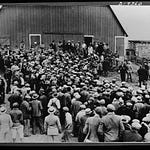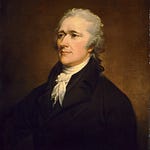We Don’t Build a Country on Things We Can Touch
Not really.
We build it on belief.
We believe a piece of paper can be worth a dollar. We believe strangers can govern us. We believe that if we follow the rules, justice and liberty will protect us.
None of that is real, not like gravity or fire.
But it works because enough of us believe. That’s what holds a nation together. Not armies. Not buildings. Not slogans. Belief. We think institutions hold society together. But it’s the other way around. We hold them together with belief.
When nothing is real, belief gives institutions value.
Today, we ask, if justice isn’t real, what is its market price?
And I don’t mean metaphorically. I mean literally. What do Americans pay out of pocket to achieve the justice our Constitution promises?
Money Isn’t Real
Money isn’t real. Not like gravity. Not like death. You can’t drop it on your foot. You can’t breathe it. It has no weight, no heat, no life.
Its value depends on whether others believe in it.
Even the bills in our wallets mean nothing. They’re just cotton paper and ink. And most money isn’t even physical. It’s digital, just zeroes and ones on a computer somewhere. If no one believes those numbers are worth anything, they aren’t.
But when enough of us believe in them, they become real.
When we go to the store to buy eggs and butter for breakfast, we might use a debit card for our purchase. We give the store some of our digital zeroes and ones for real eggs that we can eat.
In this way, money facilitates society. It’s a fiction that organizes everything from breakfast to war.
Again, money isn’t real. Even if we think it matters, that’s not enough. It only matters if others think it does. If we stop believing, our money is worthless.
But because enough of us believe in it, belief itself creates the value. The belief makes a dollar worth a dollar, and not just what the cotton paper would suggest.
This principle is society’s basis.
In the same way that money only has value because other people believe it has value, our institutions only have value when enough of us believe in them.
Our institutions aren’t real outside of our shared beliefs. They become real only because we act like they are. Religion, law, the stock market, America, and the Constitution exist only in the human mind, but once enough of us believe, we begin to shape the world.
Our churches can only bring relief to the needy in our communities if enough of us believe not in the rituals, but in the responsibility to care for the needy. It’s not a physical reality. It’s a collective commitment. Shared belief only matters if it produces real outcomes. We measure the value of our churches in meals for the needy, addiction recovery programs, volunteer hours, and youth mentoring. If those disappear, the steeple means nothing.
Our law can only bring order to society if enough of us believe it applies to all of us. If we don’t believe the law applies to all of us, order dissolves. We measure the effectiveness of law by disputes resolved without violence, access to and fair treatment in court, and access to counsel no matter your income.
Belief is the foundation of our institutions. When enough of us share these beliefs, our institutions gain value.
The Day George Washington Gave the Army Back
We think institutions hold society together. But it’s the other way around. We hold them together with belief.
Scene: December 23, 1783. Annapolis, Maryland. The war is over. The Constitution doesn’t exist yet. George Washington entered Congress to resign his military commission.
Everyone held their breath. Washington had led the Continental Army through eight brutal years of war. He was a war hero: beloved, feared, and trusted. If he wanted to become king, no one could stop him.
Rumors of Washington’s intentions to give up power had already crossed the Atlantic. King George III reportedly told the American-born artist Benjamin West that if Washington gave up power, he would be the greatest man in the world.
The American people loved him. He was a star. He didn’t have to give up power. He could be king. The night before the ceremony, they threw him a party. Washington “danced in every set, so that the ladies might have the pleasure of dancing with him, or as it has since been handsomely expressed, get a touch of him.”
But instead of claiming fame and power, he gave it back to the people. America would owe allegiance to no king, and George Washington believed in America. He would not become king.
The next day, he stood before the Confederation Congress, a weak, fragile institution barely holding the states together, and gave up command. To complete his tear-filled address, he said … “Having now finished the work assigned me, I retire from the great theatre of action... and take my leave of all the employments of public life….”
He didn’t have to. He could have stayed in command.
Washington’s single act gave birth to civilian rule. A weak Congress became legitimate, not because it inherently had power, but because one man believed it should. And once Washington believed, others followed. Washington relinquishing command transferred his belief to his fellow Americans.
His belief in rule by the people gave value to the institution that became the Constitution. When James Madison and the other authors wrote the Constitution, they opened with an idea that didn’t exist in governance: ‘We the People of the United States.’ People stopped believing that the Almighty ordained rulers at birth because they came from a ruling family. They started believing people consent to governance for life, liberty, and the pursuit of happiness.
The idea didn’t stop at the Potomac. It crossed the Atlantic. Less than ten years later, the French violently overthrew their monarchy. The streets of Paris ran red with blood. The Bastille fell. The people executed their king and queen. They refused to be subjects any longer. And it didn’t end in France. Across Europe, the old order trembled. Monarchies began to fall or reform. The divine right of kings gave way to constitutions, parliaments, and citizens.
The transfer of Washington’s belief in rule by the people to the Constitution is sharply evident. Where a king might believe primarily in order, people believe in justice. A king might believe in rules and obedience. People believe in liberty, protest, and the right to bear arms against their rulers.
His belief in rule by the people made the people believe in themselves.
Washington’s act powerfully illustrates how shared belief underpins our institutions. When we believe in an idea, we build institutions. When enough of us share that belief, those institutions gain value.
Of course, like money, we need to be able to measure this value. To measure justice, we need to pick something concrete and clear. We need measures that reflect real opportunity.
Measuring Ideas Like Liberty and Justice
Some think tanks say they can measure the payoff of our belief in the Constitution’s promises. They call their metrics “market quotes” on the value we assign to liberty, justice, and other national ideals.
Organizations like Freedom House publish global reports with titles like Freedom in the World. They attempt to track civil liberties and political rights across 195 countries. These reports have been cited for over 50 years.
But we should reject every proposed measure that comes from outside sources instead of the people. The people are the governed, and only the governed can say whether they are free. An external judge of internal values falls short.
Others suggest questionnaires, letting people rate their own experience. But surveys are subjective. If belief is real, it must leave a measurable trail. We must be able to measure our values like we measure the dollar.
So, how would we measure ideas like liberty and justice? Let’s consider justice. Justice has a dual meaning. It is equal treatment under the law, and it is access to fair opportunity, no matter where you were born.
Let’s consider two critical areas in society: housing and education. Why these two? Because where you live and what you learn directly determine the opportunities you have. Housing and education aren’t luxuries. They’re the foundation of fairness.
Genius hides in poverty. A child born in a trailer or housing project must succeed by structure, not by luck.
We need empirical data to measure whether we achieve our national goal of justice. If they are willing to work for it, a kid born in a trailer or project housing needs to be able to buy a house in a safe neighborhood with a good school for their children.
To measure our ability to achieve this goal, we need a test. To pass it, America needs a healthy supply of homes for first-time homebuyers that cost only double the household median income. The median cost for a house in 1960 was $11,900, when the median income was $5,600. The median household income in 2023 was $80,610. So a fair entry point today would be a home under $160,000.
Next, education.
Any loan a low-income student must take to attend a public college is a measurable price of fairness. That price tells us how far short we fall of our national ideal.
We need to track three numbers; each for first-time, full-time undergraduates from the bottom income quartile at in-state public colleges:
First, the average net price after grants: tuition, fees, living costs, minus all aid. If that price rises faster than family income, the system is failing.
Second, the average federal loan balance at graduation. If the poorest students graduate with the biggest debts, we have not achieved equal opportunity.
Third, the three-year default rate on those loans. If defaults are rising, the ladder of opportunity is breaking.
We Believe
When we believe in an idea, we build institutions.
When enough of us share our beliefs, our institutions gain value.
If money isn’t real…
If liberty and justice aren’t real…
If even America isn’t real...
Then our common belief is everything.
Led by George Washington, ‘We the People’ owe allegiance to no king. We believe in the America that is justice and liberty for free people.
Simple ideas, like access to housing and education for Americans no matter where they were born, are achievable. But we will not achieve our goals if we do not measure them.
Justice might not be physical, but its price, what ordinary people pay just to access fairness, is as real as any dollar.
So, if justice isn’t real, what is its market price?
May God bless the United States of America, as we work to ensure every American, rich or poor, has the chance to work, to succeed, and to prosper together.
Music from #Uppbeat
https://uppbeat.io/t/vens-adams/adventure-is-calling
License code: 7TYGIBPLI2MRUBGU













